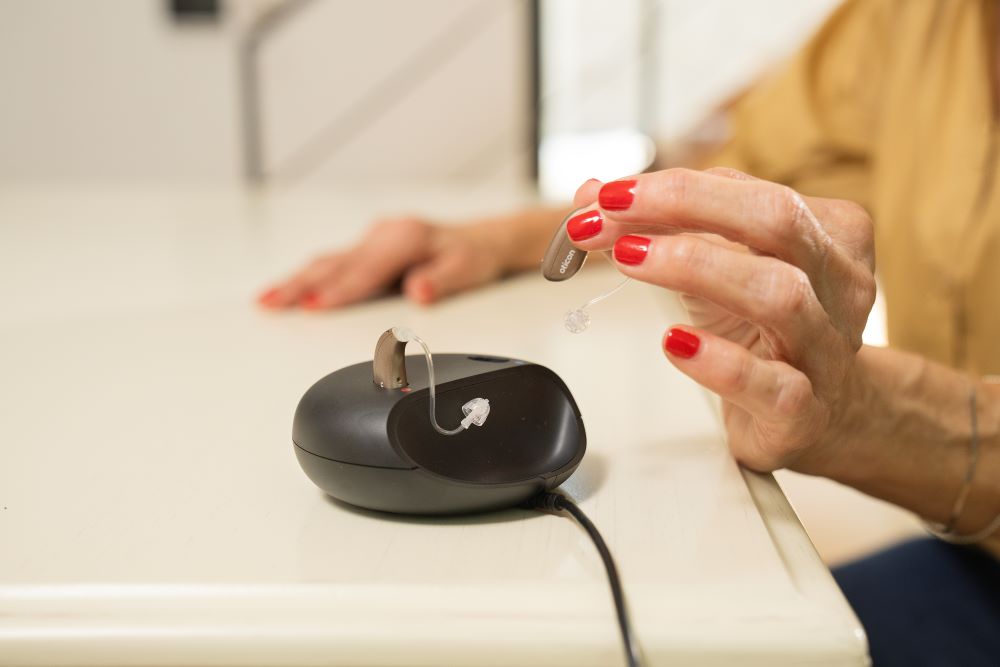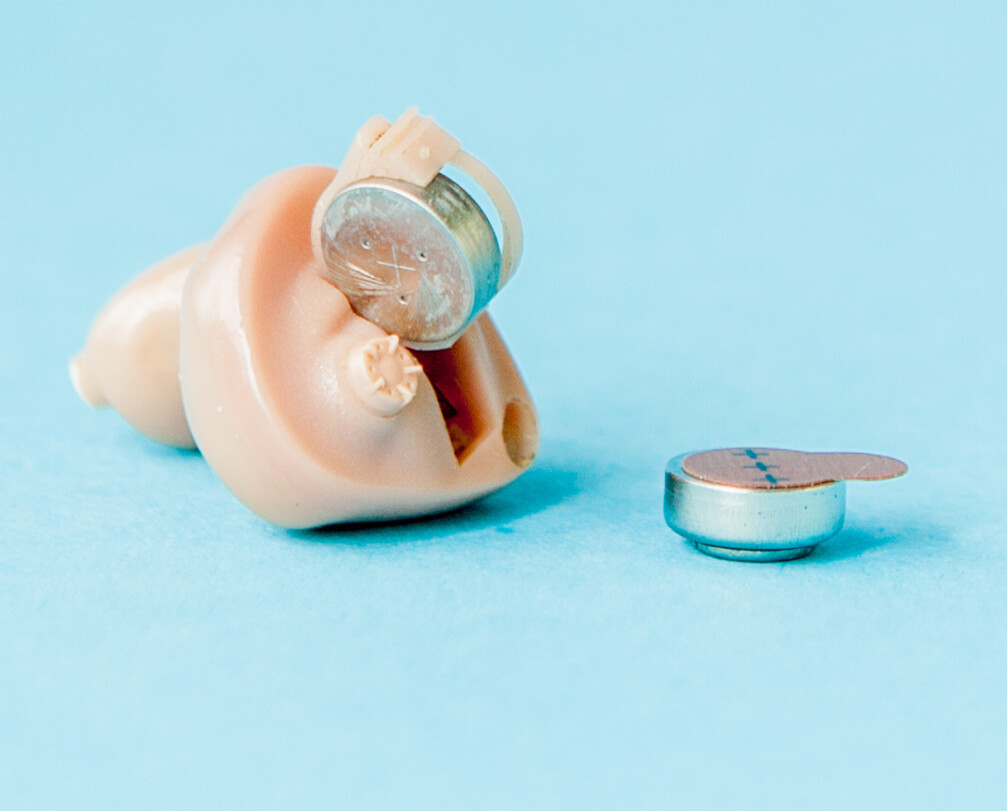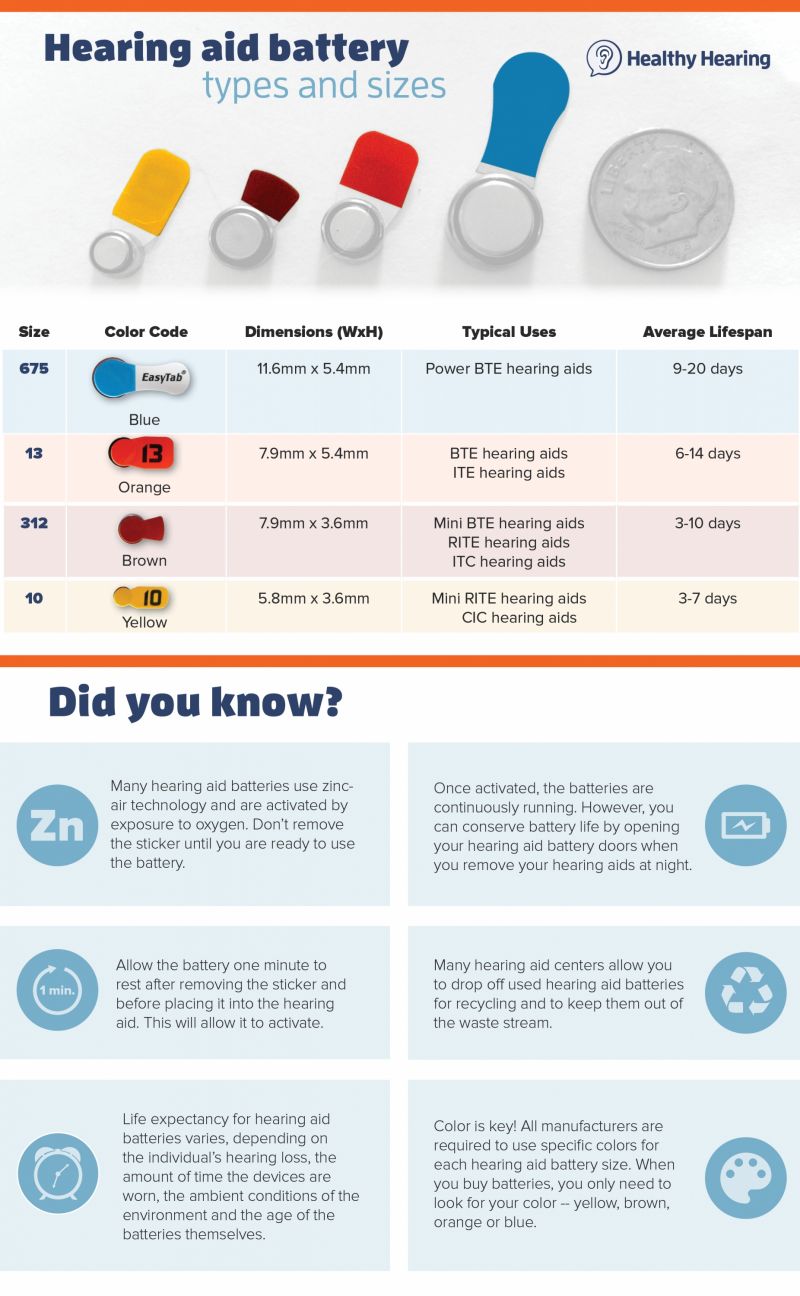|
www.HealthyHearing.com |
Hearing aid batteries
By Joy Victory, managing editor, Healthy Hearing  Reviewed by
Megan Gerhart, audiologist Reviewed by
Megan Gerhart, audiologist Last updated on: October 17th, 2024 Hearing aid batteries power your devices. Rechargeable hearing aids are increasingly popular, but in some cases, replaceable "button" batteries are still used. Like any technological device, hearing aids run on batteries. Traditionally, most hearing aids used tiny "button" batteries that wearers had to replace every few days to weeks. Now, though, many hearing aid models come with rechargeable batteries. When choosing a hearing aid, it's a good idea to think through which battery type works best for you. Two main types of hearing aid batteriesRechargeable batteries
Many of the latest hearing aid models come with rechargeable lithium-ion batteries. These batteries are usually recharged at night, when a hearing aid wearer takes out their hearing aids to sleep. They are available in both behind-the-ear and in-the-ear models. Rechargeable hearing aid brands on the market from manufacturers in 2024 include:
Please note other manufacturers also may offer rechargeable hearing aids; these are some of the top-sellers. How do rechargeable hearing aids work?Rechargeable hearing aids work very similar to smartphones—you must charge them frequently to keep them functional. Most of them come with an easy-to-use docking station. Each night, just take out "your ears," plug them into the charger, and go to bed. By morning, they should be ready for another day of full use. How long do rechargeable hearing aid batteries last?They're intended to provide a full day's use before needing recharging. But, battery life will vary—heavy use of Bluetooth, for example, may drain the battery faster. The downside? It's pretty simple: If you can't charge your hearing aids, they won't work. So they don't work well for everyone, and that's where hearing aids with disposable batteries come in. More: Pros and cons of hearing aids with rechargeable batteries How do you charge them?Gently remove your hearing aids, clean them, and place them in the designated (left or right) docking stations. Left ears are typically marked blue, and right ears are marked red. Most chargers will have flashing lights indicating they are charging, while a solid light means they are charged. In newer hearing aid models, you do not need to turn them off prior to placing them in the charger. Standard disposable batteries
becoming far less common. Before rechargeable devices became standard, all hearing aids came with disposable Zinc-air "button" batteries. However, fewer manufacturers are using these kinds of batteries. They're most typically used in "power" hearing aids for severe or profound hearing loss, which have higher battery demands. Because zinc-air batteries are air-activated, a factory-sealed sticker allows them to remain inactive until it is removed. Once peeled from the back of the battery, oxygen will interact with the zinc in the battery and “turn it on.” To get the best performance from a zinc-air battery, wait about one minute after removing the sticker to fully activate before placing it in the hearing device. Replacing the sticker will not deactivate the battery, so once the sticker is removed, the battery will remain in an active state until the power is drained. Zinc-air batteries remain stable for up to three years when stored in a room temperature, dry environment. Storing zinc-air batteries in the refrigerator has no benefits and could cause condensation to form under the sticker, which could reduce battery life prematurely. Traditionally hearing aid batteries were produced using trace amounts of mercury to assist with conductivity and stabilize internal components, but mercury is no longer used in hearing aid batteries.  (Key: BTE=behind the ear, ITE=in the ear, RITE=receiver in the ear; ITC=in the canal; CIC=completely in the canal.) Sizes of disposable hearing aid batteriesHearing aids come in many different sizes and styles and with different power needs. Larger hearing aids require larger batteries. There are four sizes of hearing aid button batteries available on the market. The sizes from smallest to largest are: 10, 312, 13 and 675. Hearing aid batteries are all smaller than the diameter of a dime:
Color-coding for disposable hearing aid batteriesBecause size differences may be hard to notice and difficult to remember, battery packaging is color-coded so finding and purchasing the correct ones is easier.
Battery life for hearing aid batteriesNon-rechargeable hearing aid batteries can last anywhere from five to 14 days, based on a 16-hour day of wear. This is dependent upon the size of the battery and power needed by the hearing aid. Typically, smaller batteries have shorter battery life than larger ones. The average lifespan of hearing aid batteries is as follows:
If you are experiencing shortened battery life, there may be an issue with the hearing device. In this case, you should consult your user manual or contact your hearing healthcare professional to make sure everything is working properly. How to extend the life of a hearing aid batteryWhile there aren’t any foolproof ways to extend non-rechargeable battery life, these tips will ensure the power isn’t being wasted. Turn the hearing devices off when not in use and leave the battery compartment door open overnight. Not only will this help keep battery power from being wasted, it will allow any moisture that has built up from the day's use to evaporate overnight. To get optimal performance from your batteries, always store them at room temperature. Heat exposure and humid environments such as a bathroom will shorten battery life. Also, batteries shouldn’t be carried loose in pockets, a purse or a backpack where they might come into contact with other metal objects like coins or keys that can short-circuit the hearing aid batteries. More: How to get the most from your hearing aid batteries Hearing aid battery brandsCommon manufacturers of non-rechargeable hearing aid batteries include Rayovac and Energizer. However, many hearing aid manufacturers sell batteries wholesale to hearing care professionals, and the batteries may carry the brand name of that hearing aid manufacturer. Another common practice is private labeling of batteries. This means the hearing care professional may purchase batteries wholesale and have them labeled with the name, address, phone number and logo associated with their office. Regardless of the branding, most hearing aid batteries are made by trusted companies that produce other types of batteries for all types of electronics. Hearing aid battery safetyAccording to the National Capital Poison Control Center, more than 3,500 Americans of all ages swallow disposable button batteries every year. If this happens to a person or pet in your home, seek medical attention immediately. More: Hearing aid battery safety and disposal Where to purchase hearing aid batteriesBatteries are typically available in mass retail stores, pharmacies, grocery stores, electronics stores and through online retailers. You might also choose to purchase batteries through a hearing aid center near you. Because hearing care providers go through their stock of batteries quickly, many wearers feel they are getting fresher batteries. Also, if you forget what battery size you need for your particular device, the hearing healthcare professional will ensure you are purchasing the correct one. Additionally, it’s worth asking if your hearing health practitioner offers any kind of battery club or discount program. These programs can save you money on your battery purchases and, in some cases, you can request the batteries be sent directly to you saving you a trip to the office. Joy Victory, managing editor, Healthy Hearing
You are reading about: Related topics
More information about hearing loss, hearing aid brands, assistive devices and tinnitus. Featured clinics near me
Earzlink Hearing Care - Reynoldsburg Find a clinicWe have more hearing clinic reviews than any other site! Related contentThe Healthy Hearing Report |
|
www.HealthyHearing.com |
Hearing aid batteries
By Joy Victory, managing editor, Healthy Hearing  Reviewed by
Megan Gerhart, audiologist Reviewed by
Megan Gerhart, audiologist Last updated on: October 17th, 2024 Hearing aid batteries power your devices. Rechargeable hearing aids are increasingly popular, but in some cases, replaceable "button" batteries are still used. |



 Joy Victory has extensive experience editing consumer health information. Her training in particular has focused on how to best communicate evidence-based medical guidelines and clinical trial results to the public. She strives to make health content accurate, accessible and engaging to the public.
Joy Victory has extensive experience editing consumer health information. Her training in particular has focused on how to best communicate evidence-based medical guidelines and clinical trial results to the public. She strives to make health content accurate, accessible and engaging to the public.